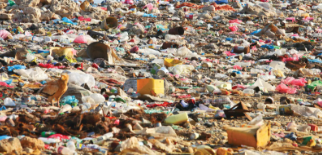
Global efforts to secure an international legally binding instrument on plastic pollution, including in the marine environment, have adjourned without reaching any agreement.
More than 3,300 delegates from more than 170 nations and 440 organisations have been meeting in Busan, Korea, since November 25 for the Intergovernmental Negotiating Committee (INC-5 ).
The fifth session only agreed on a chair’s text, which will serve as the starting point for negotiations at a resumed session in 2025.
World Wide Fund for Nature led the chorus of complaints by conservation NGOs unhappy with the outcome. “It has now been more than 1,000 days and five negotiation meetings since governments agreed to establish a legally binding treaty to end plastic pollution,” WWF global plastics policy lead Eirik Lindebjerg said.
“Over this time, more than 800 million tonnes of plastic have been produced, over 30 million tonnes of which have leaked into our ocean, harming wildlife, poisoning ecosystems and destroying lives, to say nothing of the plastic that has been sent to landfill or burnt.”
Lindebjerg said for too long, a small minority of states has held the negotiation process hostage.
“It is abundantly clear that these countries have no intention of finding a meaningful solution to this crisis, and yet they continue to prevent the large majority of states who do,” he said.
“It is unjust that those who bear the greatest burden of plastic pollution are being denied the opportunity to forge a solution among themselves by those profi teering off the unregulated production and consumption of plastic.”
WWF vice president Erin Simon said it’s disheartening to walk away from INC-5 without a meaningful treaty in hand.
“Allowing a minority of actors to obstruct progress through the week predictably resulted in breaking the promise made at the beginning of these talks,” he said.
“When member states unanimously agreed to deliver a treaty the planet needs by 2024, the world believed them. Now, the price for inaction is far greater than wasted time. It puts both planetary and human health on the line and sets us up for a scenario where ambition could diminish over time.”
Pan-African Plastic Project lead Hellen Dena said they went to Korea with a shared vision of getting a treaty to protect fenceline communities who bear a disproportionate burden of plastics pollution stemming from constant exposure and intake of plastics.
“It’s a pity that member states continue to dance around the negotiations, disregarding the dire consequences of plastic pollution on human health and the environment,” she said.
Through the week, members negotiated two documents by the INC chair, Amb Luis Valdivieso, before agreeing on the closing day to transmit the Chair’s Text to the session.
Unep executive director Inger Andersen said the world’s commitment to ending plastic pollution is clear and undeniable.
“Talks in Busan have moved us
closer to agreeing on a global legally
binding treaty that will protect our
health, our environment and our future from plastic pollution,” she said.











